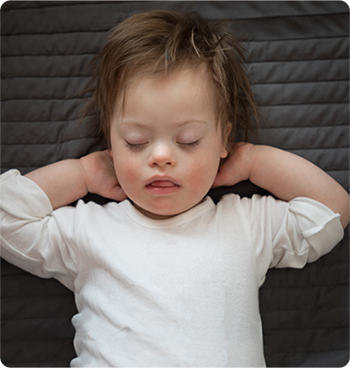Children with Down Syndrome are six times more likely to be at risk of having sleep disordered breathing. Their sleep can also be impacted by the social environment, brain abnormalities, medications, disruptions to routine and parental stress.
Although treatment is available, world-first research led by Queensland Children’s Hospital paediatric respiratory and sleep physician Jasneek Chawla found many families were not asking for help with their child’s sleeping issues, because they saw them as normal for a child with Down Syndrome.
The study also identified a need for greater understanding among primary care physicians that sleep difficulties in children with Down Syndrome can be effectively treated.
Dr Chawla’s study asked 30 parents who attended the Queensland Children’s Hospital sleep clinic with their child what it was like caring for a child with Down Syndrome, including questions about their own experience with sleep and the health care system.
Dr Chawla said the interviews highlighted how much of a struggle it was for the families and how important sleep was to the way families functioned as a whole.
“It really showed us that a child not sleeping, who also has a disability, has a massive negative impact on the parents’ ability to cope with that child and to function in everyday life.”
Dr Jasneek Chawla “We had families tell us how socially isolated they felt because they were so tired, how they didn’t have the patience they wish they could have with their child because they were too tired themselves.
“We heard stories of parents neglecting their own wellbeing – feeling like they couldn’t exercise or do things for themselves. This was linked to looking after a child with a disability and looking after a child in general.”
 “The way they manage this is to normalise it; to say that ‘this is actually a normal part of life for us and we just have to accept that our child doesn’t sleep well’,” she said.
“The way they manage this is to normalise it; to say that ‘this is actually a normal part of life for us and we just have to accept that our child doesn’t sleep well’,” she said.
“That’s not actually what they should be feeling like”.
“Something is going wrong here – we really need families to understand that they can reach out for help in getting their child to sleep.”
Dr Chawla said treatment was available for sleep difficulties and families who accessed it felt it greatly improved their quality of life.
However, the study also showed families who had previous negative interactions with the health care system, particularly parents who were offered a termination after the prenatal screening, did not consider seeking help.
“What we’re finding, especially with sleep, is because it’s something people are normalising and thinking that is what they should expect for a child with Down Syndrome, if they’ve had negative experiences with healthcare, they don’t seek support,” Dr Chawla said.
“We need to help primary care physicians understand that sleep difficulties in children with Down Syndrome should not be dismissed.”
Dr Jasneek Chawla As a result of the study, Dr Chawla’s team worked with Down Syndrome Queensland to create fact sheets and webinars about different aspects of sleep in children with Down Syndrome to assist families and medical professionals.
The findings of the study were published in Behavioural Sleep Medicine in November 2022 and in Health Sociology Review in early 2023.
Dr Chawla’s team is also preparing to publish a paper on what it’s like to be the sibling of a child with Down Syndrome with sleep problems, based off sibling interviews conducted at the same time as the parent interviews.